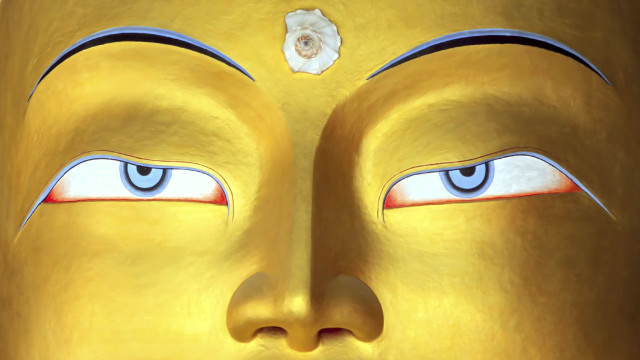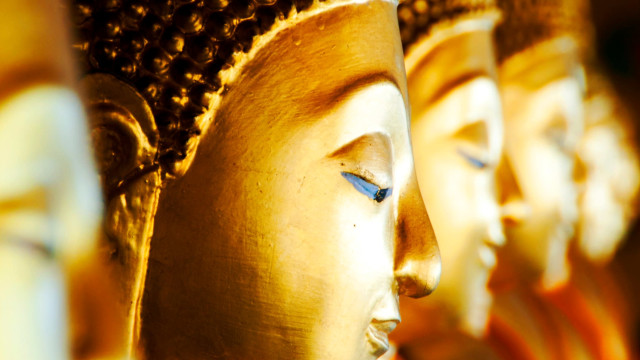Meditation Articles
Curious about how meditation can help you live a healthier, happier life? Read about the health benefits, scientific background, and basic techniques of these practices.
188
Articles

Learning to Love Me, Myself, and I
Learning to fully accept yourself through the act of self-love can boost happiness and promote emotional resilience.

Meditation Versus Mindfulness
We often think of them as one and the same, but meditation and mindfulness are actually two distinct practices.

Nighttime Routines to Curb Anxiety
Add these wellbeing interventions to your nightly ritual to improve the quality—and quantity—of your shut-eye.

Strong Connections on and off the Apps
Instead of experiencing love through your likes, apply a little more mindfulness into your day-to-day interactions to achieve the same feeling.

Yoga for Better Health
Yoga more than just a physical activity — it’s a mind-body practice that also includes breathing exercises, relaxation, and meditation.

Meditation Helps Personal Growth
In science and mindfulness, personal growth isn’t just a component of wellbeing, it relates to each element of wellbeing.

Why Grief Never Expires
The honest thing to admit is that you're never letting go of your grief. It's like gaining the holiday five. Another way to consider your grieving timeline is giving yourself time to remember, not forget.

This App Can Make You Healthier
Roundglass has developed a treatment model called Reframe that offers a wholistic approach to wellbeing by integrating a full spectrum of science-backed, mind-body practices.

Try This Beginner Visualization
Adding visualizations to a regular practice can have powerful effects on wellbeing. Here’s how you can supercharge your practice.

How to Handle Your Stress Addiction
Learn how to combat toxic productivity and build a solid "stress-less" routine.

Mindfulness for the Classroom
Try these simple, effective mindfulness tools for a focused classroom with engaged students.

Vinyasa Yoga for Beginners
Vinayasa can be seen as a way of flowing in the world as well, framing things in cycles with a beginning, middle, and end.

Try This Practice for Self-Love
Research shows that practicing loving-kindness for as little as 7 weeks reduces stress, improves cognitive function, and increases positivity.

Ease Pain with Meditation
In the race to find relief, researchers are increasingly looking at non-pharmaceutical solutions like meditation.

Is Mindfulness a Leadership Trait?
It’s through conscious awareness that we can begin to develop empathy, benefiting both leaders and employees alike.

4 Healthier Social Media Habits
If you find yourself ruminating on negative thoughts or comparisons, try these exercises to pull you back into reality.

How to HALT Crappy Feelings
If the idea of pausing to check in with yourself sounds familiar, that’s because the HALT method is a mindfulness practice.

Sleep Better, Starting Tonight
Integrate one or more of these practices into your daily routine to reap all the benefits of healthy sleep — starting tonight.

Get Comfortable with Stillness
Contrary to popular belief, sitting in stillness isn’t siloed to meditating in a quiet room—you can also be in motion.

How to Make Meditation a Habit
Bringing the quality of mindfulness into any activity is a good way to start your meditation practice.

The Case Against Resolutions
Use mindful awareness to shift your relationship with financial strain, navigating family relationships, and change in routine.

A Better Way to Reach Your Goals
Resolutions declare what you want to start, while goals take action toward a desired future.

21 Days to Less Anxiety
Finding focus can be difficult when you’re feeling anxious. Quiet your racing mind with these mindful practices.

Why You Should Meditate in Nature
Reminding ourselves of natural cycles makes living through the ups and downs of life feel less overwhelming.

Find Focus with Meditation
Knowing your strengths and weaknesses can help in making mindful lifestyle adjustments that help you stay motivated.

Find Your Natural Energy Source
While everyone has a unique personal rhythm, many may benefit from a midday rest period when feeling fatigued.

Optimize Your Morning Routine
With tons of books, podcasts, and articles promising to reinvent your morning, know which routine is right for you.

Are You Lonely or Uncomfortable?
Meditation can help you sit with your feelings and take more control when loneliness creeps up.

RG Spotlight: Prakriti Poddar
Poddar’s decision to follow her purpose has led to an extensive career at Roundglass helping others actualize mental health.

How To Raise Mindful Kids
We learned from a handful of parenting experts, and created a list of parenting tips and tricks for raising an evolved being.

7 Steps to Manage Difficult Emotions
It might seem counterintuitive but facing your emotions can support you in processing them.

How to Build Healthier Habits
It’s time to reimagine how we look at habit building and consider shaking up routines with some help from the experts.

Why You Need to Start Meditating
Maintenance of the mind should be a daily priority, but it takes a back seat to our physical needs. Enter meditation, a source for healthy balance in a busy world.

Living with Earplugs Out
Now that I wasn’t able to find time for my regular meditation routine, I wondered how meditating at all could help.

Change Your Habits with Meditation
We see meditation as not just a healthy habit, but as a lifestyle practice that helps build healthy mental and behavioral habits.

Don’t Set SMART Goals
By choosing a goal that's bigger than yourself, you're acknowledging that you don't have all the answers.

Mind-Body Benefits of Meditation
Meditation offers a variety of scientifically-backed benefits like improved sleep, reduction in stress, and higher overall happiness.

5 Common Myths of Meditation
Meditation is for anyone, and the key to unlocking the benefits of a regular meditation practice reside in understanding fact from fiction.

5 Ways to Live Beyond Fear
What you’re most afraid of is usually a past projection. Understand the source of your fears, so you can face your challenges mindfully.

Tricks to Stop Stress Eating
'When people soothe themselves with food, what they are trying to do is calm their nervous system.'

Mindful Eating For Kids
Call out smells and sensations to get your kids excited about paying attention to their meals.

Religion Can Learn From Mindfulness
Religion could benefit from mindfulness practices — giving it a radical approach that will resonate with future generations.

Expand Your Practice: Doshas
A central theme of the practice is to create a balanced lifestyle that supports energy flow in the body for wholistic health.

Expand Your Practice: Ayurveda
Ayurveda aims to find a state of equilibrium in the body, and meditation is one of the modalities used for this harmony.

Mindful Eating: Unpack Your Hunger
Discerning the type of “hunger” we are experiencing is crucial in removing any negative feeling that affect our food choices.

Winter Solstice Wellbeing Rituals
Winter solstice reminds us to honor taking time to slow down, and release what is no longer serving us.

Do You Meditate with Your Pet?
Getting centered with your pet can also help support your meditation practice. Bring your focus to your beloved pets to foster inner peace.

Mindfulness for Every Meal
To move away from habits and cravings, and toward awareness, we must chart our body’s day-to-day needs.

Why You Need A Gratitude Jar
Once your brain is trained to focus on positive experiences, you bring more positivity into your everyday life.

Start A Daily Meditation Habit
The more we practice meditation, the better we are at tracking what’s going on in our lives and the world around us.

Try This: Mindful Listening
Mindful listening teaches us that once you have awareness of what you are hearing outside and within, you can learn to let go of distractions.

Pushing Past Pain With Meditation
I saw how our ancestry can shape us. And I saw how, along with generational trauma, comes generational wisdom.

What Is Attention Activism?
This mindfulness practice helps to highlight the need to reclaim our attention with intention.

The Benefits of Eating Like a Yogi
The need to keep your body in a state of calm involves focusing on the timing and quality of food.

The 5 States of Mind
To reach the state of absolute calmness and balance, we must first understand the different states of mind.

5 Tips For Mindful Eating
When we are not appreciating and enjoying, we then tend to think more of quantity rather than the quality of food.

How to Start Meditating
Starting small with a 30-second practice sends a powerful message to the brain that we can quiet our thoughts briefly.

What's Your Meditation Style?
Some prefer guided-meditation, and for teachers or individuals with an advanced practice, self-meditation may work better.

The Mindfulness Effect on Stress
'Breath control is the most effective way to control our stress, and regulate the stress response when we're reactive.'

Meditate in Your 20s: The Why
Being 20-something is prime time to understand your mind and heart and to undo any intergenerational trauma.

5 Ways to Heal Your Inner Child
When you feel old wounds drowning out your authentic self, use these tools to help heal your inner child.

Here’s How Music Can Help You Sleep
Few adults fall asleep to lullabies anymore, but studies show we might want to consider it.

How Meditation Can Help You Sleep
While focusing on fluffy white sheep can be helpful, focusing the mind through meditation practices is even better.

What Are the 8 Limbs of Yoga?
When practiced, Patanjali’s Yoga Sutras function as steps to controlling the mind in pursuit of liberation.

What Happens with Daily Meditation?
Long-term mindfulness may influence your approach to pain, inviting curiosity and acceptance rather than fear or denial.

Build Stronger Relationships
Try and love one person without limits or bounds. If you can commit to this, everything else will feel small compared.

How to Find Life’s Purpose
Rather than searching for your purpose, or dharma, outside of yourself, ask why you’re feeling lost or unfulfilled.

How to Meditate for Beginners
Let go of what you think meditation is, what you believe meditating looks like, and if you're doing it 'right.'

Buddhism Helped Heal My Addiction
When I brought awareness to my dark parts and understood the chaos they were causing, my true healing began.

A Powerful Tool for Radiant Health
It can be tough to focus the mind, but science now proves an inherent correlation between the mind, breath, and energy.

Magnetism: The Key to Success and Wellbeing
When our willpower is bound heavily by habit, it ceases to draw upon inspiration. Here's how to change that.

Breathe Your Way to Deep Relaxation
Not surprisingly, diaphragmatic breathing slows the heartbeat and lowers or stabilizes blood pressure.

The Secret to True Self-Acceptance
To build the world each of us deserves, it's important to truly love our ethnic background from a place of compassion.

Connect to Nature From Anywhere
Don’t let being inside or the busyness of the day keep you from getting your daily dose of the natural world.

3 Ways to Find Presence Right Now
Feeling dull or disconnected is a byproduct of the overdrive and hyperactive states we often find ourselves in.

5 Ways to Find Calm
Don't be fooled by the simplicity of these quick, accessible, and in-the-moment practices; they work well for a reason.

Meditation to Live More Fully
Mindful pauses allow you to experience brief moments of beauty or intensity you may have been too distracted to notice.

How I Made Deep Adult Friendships
Just the awareness of the way I was walling myself off from others, changed me. Something started to soften.

Feeling Lonely? Ask Yourself This
Like a stomach rumbling, the feeling of loneliness is an alarm bell. In this case, it’s telling us that we need connection.

3 Mindfulness Tips for New Parents
Instead of letting your mind make up a story about how parenting is going to be, learn to embrace the unknown.

Understanding Your Fear of Failure
If we want grow in the way that I think we are meant to in our journeys — we have to look right at that fear and deal with it.

Find Your Center with Whiring
In whirling, we release dependence on the outside world and develop a deep inner centering.

Find Deep Healing Through Whirling
Whirling doesn't cause anything to happen, necessarily, but it does allow energy to shift, bringing us into a healthy balance.

How Mantra Changed My Life
One of the remarkable things about mantra is it does deep work on you, but not in a flashy way. It’s steady and consistent.

5 Benefits of Chanting Mantra
When you chant mantra, you fall into a repetitive trance. This helps regulate your breath, training it into consistent rhythm.

Try This Mantra to Honor the Sun
Chanting Gayatri Mantra regularly may assist in promoting better memory and concentration, while bringing peace.

How to Connect to Your Ancestors
These connections can help us feel more fulfilled and supported in our lives, and they are not mutually exclusive.

7 Benefits of Visualization
Creating better outcomes isn’t just about visualizing a situation; it’s also about being your best self.

The Secrets of Sanskrit
Many who study Sanskrit refer to 'the Sanskrit effect,' in which they experience what seems to be enhanced verbal memory.

How I Learned to Whirl
As my practice continues, I have learned that anything can be a teacher when we tune in to our hearts.

8 Common Myths About Whirling
Whirling can bring about misconceptions with its mysterious ways, but the practice starts and ends as a meditation.

5 Health Benefits Of Mindfulness
Mindfulness skills are well-suited to help people engage with uncomfortable, frustrating, and traumatic encounters.

You Are More Creative Than You Think
Creativity can be perceived as your unique style and imprint on everything you do.

Use Kundalini To Deepen Intuition
I was always aware of my intuition, but I did not always have the wherewithal to act on it before practicing Kundalini yoga.

Mindful Breathing Isn’t For Everyone
I found a teacher who offered visualizations while working with the breath, and techniques for grounding in the body.

3 Virtues That Benefit Humankind
As you cultivate these virtues, you’ll find you’re giving a gift not only to yourself, but to the world around you.

Chase Peace, Not Happiness
I believe we should set our sights on peace of mind, because when our mind is calm, it doesn’t matter if you’re happy.

5 Steps to Change Any Habit
To change our lives, we need to analyze the behaviors we don’t like and think of different ways to act.

4 Ways to Build A Resilient Mind
If you want to live a fruitful life, you need to create resilience by focusing on purpose, persistence, sensitivity, and analysis.

5 Questions For Spiritual Detox
You don't need a shaman to detox your heart of negative emotions. Start with these questions, and the work will unfold.

To Find Happiness, Stop Chasing It
I noticed how everyone – myself included – constantly chased after these ephemeral pleasures of life, never quite satisfied.

Ways to Heal From Inside to Out
By losing my life as I knew it, I was given the opportunity to change everything I was doing and create a brand-new life.

Cultivate Love for Your Body
Our culture supports being critical of our bodies, but if we can love them instead, we can change our lives.

To Love Yourself, Know Yourself
It took a cancer diagnosis, lots of inner work, and a lifestyle change to help me realize I needed to cultivate self-love.

Michael Jordan and Mindfulness
While this is popular among athletes now, it wasn’t as widely known in the 1990s.

How to Leave Your Comfort Zone
If you lead a fortunate life, then there’s a high chance that you’re probably not very resilient when the going gets tough.

Preserve the Depth In Meditation
People, places, things, ideas, and experiences are all, at their core, made of the same source energy.

Make Stress Your Tool for Good
You'll experience stress as a way to spur you on to an accomplishment.

When Anxiety Arises, Try This
While it feels counterintuitive, embracing anxiety and turning toward it can be helpful.

How Compassion Improves Your Life
As I learn to be more compassionate with myself, I've noticed I seek out others all the time for assistance.

Loving-Kindness & My Mother-in-Law
It wasn't that she changed at all; I just saw her very differently, with the help of loving-kindness.

Retrain Kindness With Meditation
Our common humanity is that we all wish to contribute, and we are all made of love.

Handle Change When You Don’t Choose It
Not all change that chooses us is negative — but generally, it's hard to adapt when we don't see the change coming.

Mindful Insights In Meditation
The body constantly delivers signs and signals filled with insight and wisdom related to emotions.

Get Comfy To Meditate
I believe if the ancient yogis had sofas in their Himalayan caves, they would have meditated on them!

Presenting My Research to The Dalai Lama
'I will watch you, whether you are really helping to build a happy, peaceful world or not [...]'

How I Learned To Like Myself
I want my students to know that it's possible to experience an awakening, and it doesn't have to be this big, lofty thing.

Mindfulness as A Superpower
We can either mindlessly react or courageously respond, becoming the heroes in our own lives.

Meditation is More Than a To-Do
Meditation as a to-do item becomes rooted in a wrong view of our fundamental human nature, inherent goodness.

How Meditation Opened My Mind
I learned my current reality was one-dimensional and shaped by various habits and emotions.

Work Emptiness Led to Meditating
A coach suggested that I needed to connect my mind, body, and heart so I could feel more fulfilled at work.

Stop Meditating On Your Own
A group atmosphere or 1:1 coaching can help you move past emotional blocks to reap the rewards of meditation 24/7.

Mindfulness Belongs in Schools
The students learned to be better citizens and I learned to be a better educator.

How Meditating Connects My Path
You're not looking to other people to please you because you know what you want, and you can express it.

Meditation Made Me A Better Friend
That seems to be a fruit of my practice — not only do I like to be around me, but other people like to be around me now.

What Complements Meditation?
A meditation teacher suggests certain activities to bolster a mindful existence.

Mindfulness Got Me Off Autopilot
We train in befriending ourselves, including all our neuroses and complexities.

Better Decisions From Meditating
When I do find myself in the throws of powerful emotions like anger or self-doubt, I'm not crippled by it the way I used to be.

Weave Meditation Into Daily Living
Sometimes being mindless can help us arrive at deeper mindfulness — and a deeper mind.

Meditation Reveals More of Who We Are
After some time, your whole life becomes meditation. Suddenly, you're alive in a life and you realize you were distracted the whole time.

How to Let Go Of Old Stories
The ability to be comfortable in my skin and to show up for my life daily has allowed me to be more fulfilled.

Practice Kindness In Meditation
Human beings are capable of limitless kindness, if only they can tap into it.

A Daily Meditation 3-Part Practice
Our thoughts and feelings aren’t permanent, but learning this can take time.

A Deeper Practice Over Time
Start small; that was the biggest thing for me — if you can do something every day, you'll see the benefits of this practice.

Does Meditation Ever Get Easier?
As we get more experienced with meditation, it allows us to reap more of the benefits, outweighing the discomfort.

How I Get Ready to Meditate
The best preparation for meditation is cultivating joy, which leads to openness and receptivity.

Meditation Helps Me as an Artist
The benefit of steadiness created a Miriam that's not that affected by the shifts around me.

Why I Chose Open Awareness
Through open awareness meditation, one rests in the intrinsic nature of our minds.

I Hated Meditating Until It Worked
After 22 challenging years of life, I was desperate for some solution. And then, Tibetan Buddhism began to work.

Here’s How I Teach Compassion
If there's one thing I like to teach, it's compassion as our natural way of being.

Be More Playful With Meditation
A playful attitude keeps us going given the repetitive nature of meditation.

Why I Use a Variety of Meditation Styles
We all have different personalities, and our minds work in various ways.

My Life Changed From Meditation
Meditation became the investigation and the practice of expanding the capacity for choice.

Why Meditating Is Like Cleaning Home
We are effectively cleaning and clearing our internal houses, the subconscious mind.

Emotional Sobriety Through Meditation
Through meditation, wellness mentor Ceasar Barajas has learned to better life with grace, and is helping others.

How Meditation Became My Home
I remain profoundly human but suffer so much less now; the experience of liberation is real for me.

Why Vipassana is Right for Me
When I found myself at home caring for my young children, I realized in a painful way that I could not just 'be.'

4 Tips for New Meditators
At first, you'll likely have enthusiasm, but that can give way to discomfort. Stick with it, though, and you'll be richly rewarded.

Seeker to Mastery In 5 Steps
Experience does not become knowledge (nor does knowledge become wisdom) in one step, one flash, or one moment.

My Anxiety After I Found Meditation
I had PTSD from 9/11, and my anxiety was through the roof. I was desperate for a solution.

You Are Who You Hang Out With
Who do you spend the most time with? Who are the people you most admire? Are those two groups of people the same?

How Meditation Supported My Ph.D.
It took a long time to recover my mental health after getting my degree, and meditation was the one thing that stayed.

I Found Meditation on the Ice Rink
While most of my friends hated figures, I fell in love with the quiet along with the sense of feeling focused.

An Effortless Meditation Style
It was like coming home, noticing that the safest, most peaceful, joyful, most loving place was inside of me.

Racing Mind? Try Meditation
Get used to being with yourself and fighting off the urge to stop because your mind is going to tell you it's not working.

Why Tibetan Buddhism Speaks to Me
Abandon this idea of a quick fix to one's problems — it's about patience and perseverance.

A Youthful Way to Approach Meditation
By harnessing the imagination, I could step that much deeper into my Self.

From Skeptic to Meditation Teacher
Cultivating a state of being that allows me to connect and feel deeply adds a richness to life.

This Blue Dot Helps Me Meditate
Every time I see the sticker, I stop and take one breath. It brings me back to a place of presence.

How a Chipped Nail Imparted Wisdom
My perfectly imperfect nails impart more wisdom than you might guess from their chipped appearance.

Concentration for a Mind at Peace
We tend to have a fixed and solid sense of self, which is not an accurate view and may also cause suffering in the long run.

Healthier Ways to Digest Emotions
Become aware of your internal communication system when someone enters your sacred space.

How to Mindfully Work from Home
If we allow ourselves the luxury of having a lie-in on workdays, we'll develop a bad habit.

When Kids Daydream It’s Meditation
We do not have to teach our kids to meditate, especially if they are shy, passive and creative. They do this well on their own.

Power of Nature: A Child’s Poem
Watching my son learn how to take in the nourishment of nature as a way to accept his emotions has been beautiful.

A Buddhist’s View On Cause & Effect
We all get affected by other people’s actions. The cause of your bad fortune may not even be your fault.

Vibrational States & Life Decisions
It's from high vibrational state that clarity, opportunity, synchronicities and joy enter your life.

How Ants Taught Me About Generosity
The rewards flow back in many beautiful ways when you do things out of goodness and without condition.

10 Ways to Be Mindful at Work
These simple practices may help you release any work-related stress and remain focused, motivated, and inspired during your workday.

Drop Mindfulness Into Each Day
Focusing on the present can change your entire perspective.

Meditation Styles That Work For Me
After much trial and error, I reached my meditation sweet spot a combo of three styles that feel the most authentic to me.

How I Found Joy on a Mall Bench
The unbearable discomfort disappeared once I stopped wanting the pain away and just sat with an open mind.

Balance Emotions With 5 Elements
Knowing a bit about each element and its properties can support you in staying present and balanced in life.

Healing My Family Through Meditation
Once I realized that my thoughts didn’t always tell me the whole truth, I became suspicious of my negative emotions.

A Loving Practice to Drift to Sleep
Without being in my body, I couldn’t feel and connect with the energy of love.

What Meditation Did For My Sanity
Little by little, I started to feel like myself again — I could feel and see the shifts in my body, especially on my skin.

How Breathwork Gave Me My Voice
It's led me to feel much more heard, validated, and confident in my intuition.

My Life-Changing Gratitude Journal
I was searching for hope, for something to help with anxiety. Then, my life improved with a gratitude experiment.

Meditation to Heal Grief
The outer world had not changed, but my inner landscape was profoundly different, with the help of meditation.

Use Your Senses to Get Present
Like our senses help us tune to the external world, they help us tune into our inner world during meditation.

My COVID Story: Finding Gratitude
When feeling overwhelmed, being grateful interrupts that neural pathway and shifts your brain chemistry.

Mantra Meditation: How It Heals
The mystical language of Sanskrit was mostly designed for the creation and spiritual use of mantras.

Facing Injustice: Know Your ‘Why’
To be silent in the spiritual and wellness community where unity is the ultimate intention is a complete contradiction.

My Depression Led Me to Meditate
I learned it's important to cry or scream if you have to. It may not feel good in the moment, but emotions will come and go.

Train the Mind: Choose Your Mantra
Once you have understood the nature of your mind, choose the mantra to which you feel attached.

3 Easy Breathing Exercises
Pranayama, or breath regulation, is one ancient yogic system geared toward either energizing or calming the mind.

The Benefits of Theta Brainwaves
Getting to a relaxed state that generates theta waves naturally happens, but what if you want to go there on purpose?

Practice Grace to Forgive Enemies
What does it truly mean to forgive others, especially those we consider enemies?